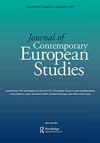赢家拿走了所有的信任:民粹主义、民主,以及中欧和南欧政治信任的输赢差距
IF 1.8
3区 社会学
Q1 AREA STUDIES
引用次数: 1
摘要
本文章由计算机程序翻译,如有差异,请以英文原文为准。
The winner takes all the trust: populism, democracy, and winner-loser gaps in political trust in Central and Southern Europe
ABSTRACT Studies typically find that supporters of populist parties exhibit low political trust. Drawing on research on winner-loser gaps in political support and the consequences of political polarization on attitudes, I re-examine the association between populism and political trust taking into account the supported party’s status in or outside of government, distinguishing between government leaders and junior coalition partners. I analyze data from the European Social Survey Rounds 1–9 from nine Central and Southern European countries that experienced populist parties as government leaders, combined with party characteristics from the Varieties of Party Identity and Organization as well as democracy scores from the Varieties of Democracy datasets. Results show that the effect of party status on political trust is stronger among supporters of populist than non-populist parties. Further, I find that supporters of populist governments enjoy greater trust advantages in less democratic contexts.
求助全文
通过发布文献求助,成功后即可免费获取论文全文。
去求助
来源期刊

Journal of Contemporary European Studies
Multiple-
CiteScore
2.70
自引率
7.70%
发文量
84
期刊介绍:
The Journal of Contemporary European Studies (previously Journal of European Area Studies) seeks to provide a forum for interdisciplinary debate about the theory and practice of area studies as well as for empirical studies of European societies, politics and cultures. The central area focus of the journal is European in its broadest geographical definition. However, the examination of European "areas" and themes are enhanced as a matter of editorial policy by non-European perspectives. The Journal intends to attract the interest of both cross-national and single-country specialists in European studies and to counteract the worst features of Eurocentrism with coverage of non-European views on European themes.
 求助内容:
求助内容: 应助结果提醒方式:
应助结果提醒方式:


